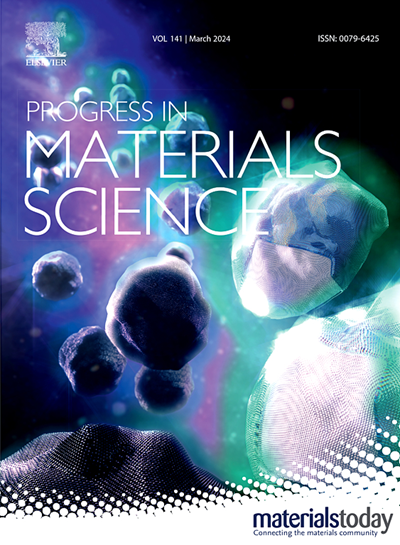全固态钠离子电池中的工程离子传输:基本原理、策略和前景
IF 40
1区 材料科学
Q1 MATERIALS SCIENCE, MULTIDISCIPLINARY
引用次数: 0
摘要
可充电钠离子电池(sib)由于其丰富的可用性和成本效益,为大规模储能系统提供了一个很有前途的解决方案。近年来,采用固体电解质的全固态钠离子电池(ASSSIBs)因其比传统的采用有机液体电解质的全固态钠离子电池(ASSSIBs)具有更高的能量密度和安全性而备受关注。尽管取得了显著进展,但缓慢的离子传输仍然是ASSSIBs实际应用的重大障碍。本文综述了离子在固体电解质、电极/固体电解质界面和asssib电极中的传输机制和面临的挑战。此外,它系统地探讨了通过工程固体电解质、界面和电极增强离子传输的代表性策略。此外,它还解决了推进高性能实用assib的剩余挑战和未来方向。本文综述了快速离子输运assib的发展历史、基本见解、有效策略和观点,为该领域的科学研究和实践发展提供了全面的指导。本文章由计算机程序翻译,如有差异,请以英文原文为准。
Engineering ion transport in all-solid-state sodium-ion batteries: fundamentals, strategies, and perspectives
Rechargeable sodium-ion batteries (SIBs) offer a promising solution for large-scale energy storage systems due to their abundant availability and cost-effectiveness. Recently, all-solid-state sodium-ion batteries (ASSSIBs) with solid electrolytes have garnered significant attention for their superior energy density and safety compared to traditional SIBs with organic liquid electrolytes (OLEs). Despite notable progress, the sluggish ion transport remains a substantial barrier to the practical application of ASSSIBs. This review comprehensively examines the ion transport mechanisms and challenges in solid electrolytes, electrode/solid electrolyte interfaces, and electrodes of ASSSIBs. Additionally, it systematically explores representative strategies to enhance ion transport through engineering solid electrolytes, interfaces, and electrodes. Furthermore, it addresses the remaining challenges and future directions for advancing high-performance practical ASSSIBs. By providing development history, fundamental insights, effective strategies, and perspectives on designing ASSSIBs for rapid ion transport, this review could serve as a comprehensive guide for scientific research and practical development in the field.
求助全文
通过发布文献求助,成功后即可免费获取论文全文。
去求助
来源期刊

Progress in Materials Science
工程技术-材料科学:综合
CiteScore
59.60
自引率
0.80%
发文量
101
审稿时长
11.4 months
期刊介绍:
Progress in Materials Science is a journal that publishes authoritative and critical reviews of recent advances in the science of materials. The focus of the journal is on the fundamental aspects of materials science, particularly those concerning microstructure and nanostructure and their relationship to properties. Emphasis is also placed on the thermodynamics, kinetics, mechanisms, and modeling of processes within materials, as well as the understanding of material properties in engineering and other applications.
The journal welcomes reviews from authors who are active leaders in the field of materials science and have a strong scientific track record. Materials of interest include metallic, ceramic, polymeric, biological, medical, and composite materials in all forms.
Manuscripts submitted to Progress in Materials Science are generally longer than those found in other research journals. While the focus is on invited reviews, interested authors may submit a proposal for consideration. Non-invited manuscripts are required to be preceded by the submission of a proposal. Authors publishing in Progress in Materials Science have the option to publish their research via subscription or open access. Open access publication requires the author or research funder to meet a publication fee (APC).
Abstracting and indexing services for Progress in Materials Science include Current Contents, Science Citation Index Expanded, Materials Science Citation Index, Chemical Abstracts, Engineering Index, INSPEC, and Scopus.
 求助内容:
求助内容: 应助结果提醒方式:
应助结果提醒方式:


